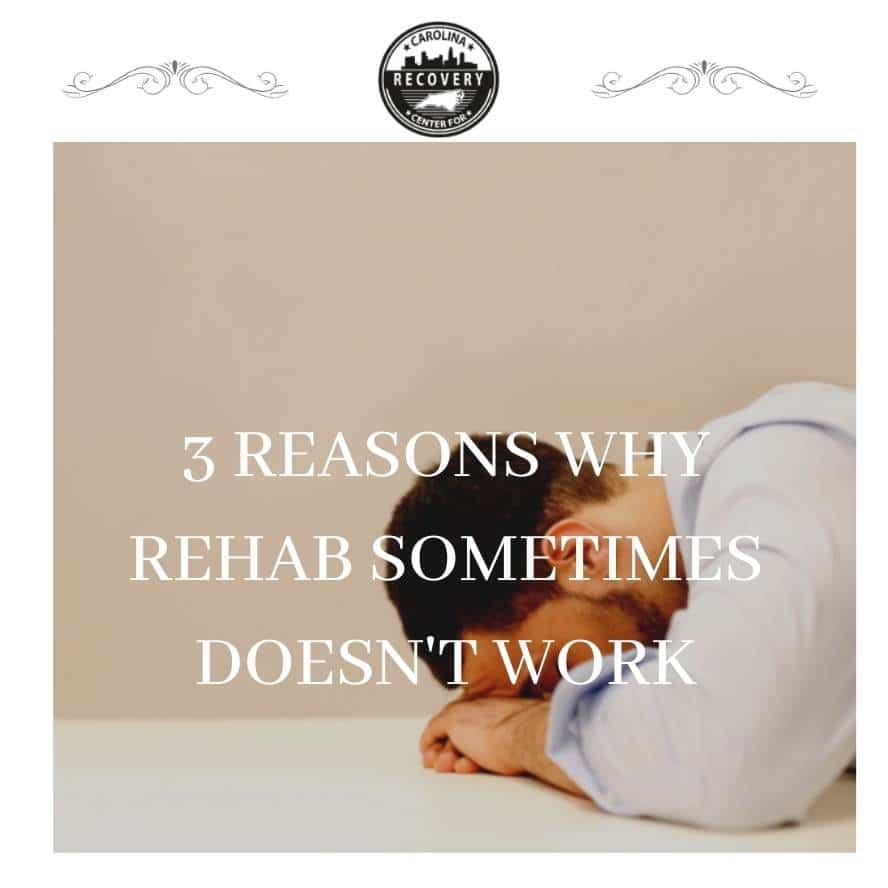3 Reasons Why Rehab Sometimes Doesn’t Work

Medically Verified: 2/1/24
Medical Reviewer
Chief Editor

All of the information on this page has been reviewed and verified by a certified addiction professional.
Addiction affects millions of Americans. When someone is addicted to drugs or alcohol, it can cause significant damage to their physical, emotional, and social health. The issue of addiction can wreak havoc on families and communities, too. No one chooses to be addicted to substances, and the people who struggle with this condition often need to do difficult work to overcome it.
Most people require treatment to overcome their addiction. Substance abuse treatment usually involves three stages: detox, treatment, and aftercare. Addiction treatment allows people to end their physical dependence on substances and learn how to live their life without using drugs and alcohol.
Addiction is a complex issue, and each person has their own journey with it. While substance abuse treatment can be very effective, some people do not succeed in staying sober after they finish their program. Understanding some of the most common reasons why rehab doesn’t work can help avoid these issues as you prepare for your own treatment program.
1. Not Enough Time in Treatment
Many people continue to use drugs or alcohol for a long time before seeking substance abuse treatment. Over time, addiction chips away at a person’s life. It impacts their physical health, finances, social life, and mental health. Addiction impacts a person’s habits, lifestyle, and the literal functioning of their brain. While damage can be healed and new habits can be learned, these things take time.
During treatment, people address and heal their addiction by doing many activities, including:
- Identifying triggers and learning how to avoid them
- Learning skills to manage cravings
- Identify harmful habits, beliefs, and patterns
- Learn new habits and coping mechanisms
- Plan for aftercare
- Adjust to a new, sober lifestyle
- Form new, supportive relationships
All of these activities take time. Many insurance companies provide coverage for 30-day substance abuse programs. When you consider the emotional and physical demands of treatment, it’s important to consider: does rehab work in such a relatively short period of time? For many people, a 30-day program is not enough for them to overcome their addiction. It is important to stay in rehab until you are stable enough to maintain your sobriety in the real world. Not allowing enough time in treatment is one reason why rehab sometimes doesn’t work.
2. Rehab Program Does Not Meet Your Needs
Addiction is not a one-size-fits-all condition. Each person has their own unique combination of biological and environmental factors that contributes to their addiction, as well as their different support systems and resources. Because everyone has their own journey into and out of addiction, substance abuse treatment must account for this and be adaptable.
A treatment program that does not address a person’s unique needs means that people will not get the help they need, learn the skills they require, or prepare for the life they will lead after the program ends.
A treatment plan must account for many individual factors, including:
- How the addiction has affected the person–their relationships, their health, their finances, etc.
- What the person has been doing to manage their addiction
- Medical or mental health conditions
- History of treatment attempts and relapse
- Existing support networks
- Childcare needs, help to find employment or housing, and the demands of their other community roles
Many people have a lack of support at home, and life after treatment can feel difficult. When someone has received adequate, comprehensive treatment, they are better prepared for their real-life after rehab and less likely to relapse. If they have not had the opportunity to work through important issues, change harmful habits, or address other issues that contribute to their addiction, they may be unprepared for lifelong sobriety. In order for rehab to be successful, the treatment program must be tailored to meet your unique needs.
3. A Traumatic Event
An important part of rehab is learning how to manage your daily life without returning to substance use. You may learn skills to manage stress, overcome challenges, and face your problems head-on without relying on drugs and alcohol to dull emotions. You will learn about your addiction and make a plan for how you will avoid or deal with your triggers.
Sometimes, though, unexpected, traumatic events happen. A traumatic event is something that causes a great amount of stress. Trauma can occur because of an accident, injury, illness, death of a loved one, job loss, assault, or any other circumstance that is highly stressful. For many people, experiencing trauma may lead to a relapse.
Some people may require prescription medications after an injury, or to help them manage the emotional aspects of trauma. Some prescription medications, such as opioid pain relievers, are highly addictive and can trigger a relapse. If you have a history of substance use disorder or have completed an addiction treatment program, it is best to avoid addictive prescription medications if possible. If your doctor has determined you require them, be aware that there is a high risk of relapse.
Find a Rehab Program That Really Works
If you or someone you love require substance abuse treatment, please reach out to the staff at the Carolina Center for Recovery. We offer a range of adaptable programs that empower people to overcome their addictions. Our programs are designed to support people at any stage of addiction recovery. Whether you’ve relapsed before and are wondering why rehab didn’t work for you or this is your first time getting sober, we’re here to help.
If you are ready for life-changing treatment, call us today.

